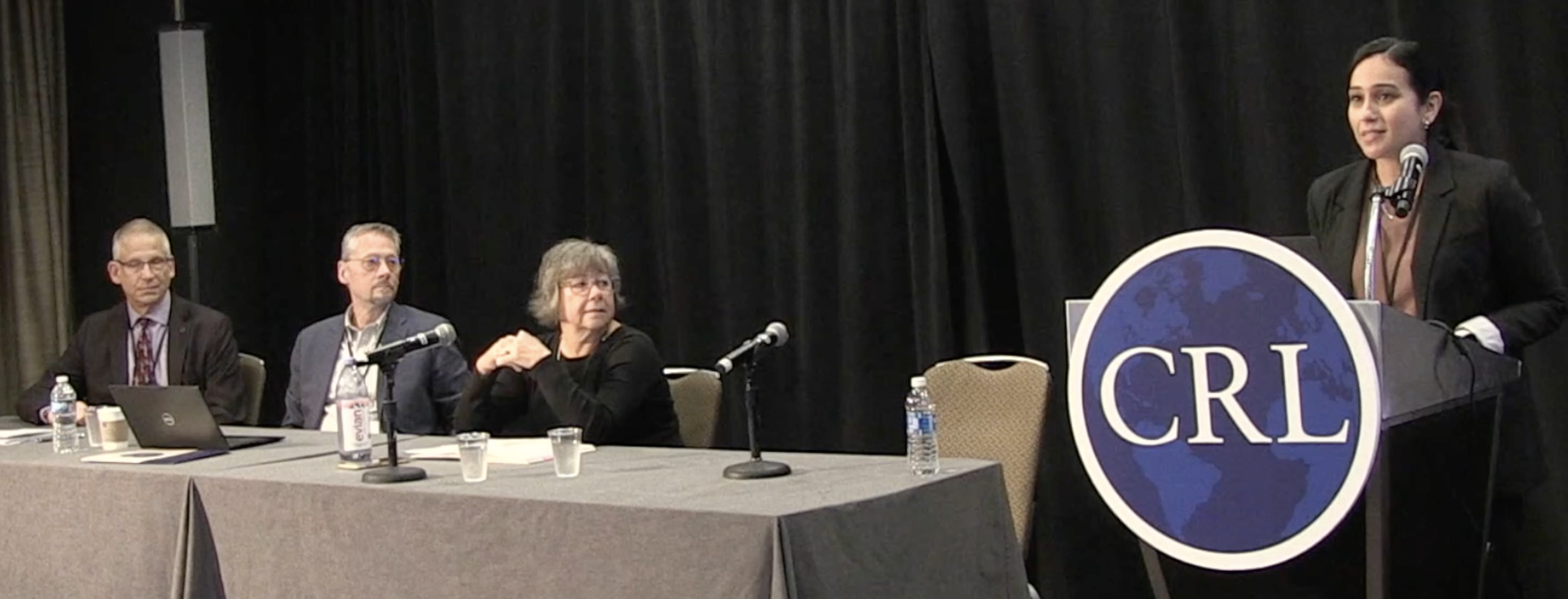
Lanette Garza, CRL’s Director of Licensing & Acquisitions, opened the 2025 Annual Meeting session “Deals and Directions: A Forum on Licensing and Negotiations” with the following remarks. CRL's licensing program is not simply a service; it's our collective voice in action. It's a place for collective advocacy that provides tangible value and strategic leverage for access to E-Resources, where we work together to secure fair pricing and drive progress towards more open and sustainable scholarly resources. How do we do that? Today, I want to spotlight the two pillars that support CRL’s licensing work. The first is CRL's global licensing program. It's designed to provide access to critical cultural heritage, resources, newspapers, humanities materials, primary sources, and more. These collections may not be easily accessible or may be out of reach for individual institutions due to cost, but it's possible for us to negotiate together for those types of resources. One example: 42 institutions now subscribe to Coherent Digital, 24 institutions subscribe to Dar Almandumah, 647 institutions combined with other consortia subscribe to The New York Times, and 105 subscribe to The History Makers. This speaks volumes to the scale and shared value we're creating together through global licensing resources. By contrast, the second pillar of our licensing work, the NERL program, focuses on the critical resources offered by major commercial publishers and STEM providers. With more than 100 agreements in place, NERL is a licensing force, but also a values-based collective. What I've consistently witnessed in NERL negotiations with publishers is a profound commitment to advocacy.
These negotiation teams do not advocate on behalf of a single institution. They advocate on behalf of the consortium. They carry forward shared core values, not individual preferences, and they ask hard questions. They hold publishers accountable, and they demand better from them. And it's not just for lower cost, although that is usually a dealbreaker in these negotiations, but we ensure that licensing reflects our community’s core values. This commitment has yielded transformative results. We've seen powerful change not just in pricing, but in pushing for greater transparency, equitable terms, and more inclusive access models.
In NERL, we discuss topics such as AI and supplier diversity. We discuss things like streaming media, and we push boundaries to create change through NERL. Building on core licensing areas, the following are brief highlights that just skim the surface of what we've achieved recently. This past year, we revised and relaunched the CRL model license. If you haven't seen our model license, I really encourage you to visit our Licensing Tools and Resources page and utilize the model license. Updating the model license was a collaborative and collective effort, guided by feedback from our members.
We also initiated our inaugural one-time group purchasing program with ProQuest in the fall of 2024. It resulted in a 55% discount and nearly $1,000,000 in savings across 22 institutions, and the momentum continues.
Looking ahead, we are actively increasing our Open Access agreements with growing publisher partnerships such as SpringerNature, Elsevier, MIT D2O, PLOS, Cambridge University Press, Annual Reviews and BioOne.
And, finally, we're deeply committed to assisting our members with accessibility, working to ensure that all licensed content complies with WCAG 2.1.
As we face major challenges, many of which Heather Joseph (SPARC) spoke to yesterday in her keynote presentation, it's critical that we reflect on the path ahead. How do we want to see CRL licensing evolve? Where do we see the most value? We've had some of these conversations within the NERL Program Council and with our CRL members. Where can licensing do better? We know we can do better. We demand better from our publishers, after all.
Watch the full "Deals and Directions" strategy forum on CRL's YouTube channel, including contributions from Liz Mengel (Johns Hopkins University), Jeff Carroll (Rutgers University), and Christian Dupont (Boston College)
